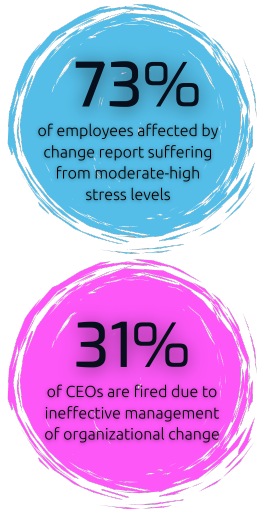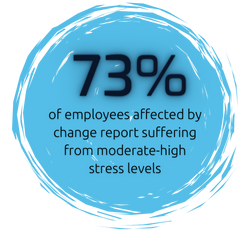How to Deal With Change at Work
The world of business is anything but static. Whether it’s a dramatic shift in organizational strategy, the implementation of groundbreaking technology, or minor tweaks to processes that have been in place for years, change is an integral part of our professional lives.
 No matter the type or scale, change at work can be a considerable source of anxiety and uncertainty. The Oak Change Report suggests that up to 18% of employees would even consider leaving their jobs if major organizational changes occurred. Additionally, Forbes revealed that 31% of CEOs are removed from their positions due to ineffective management of organizational change.
No matter the type or scale, change at work can be a considerable source of anxiety and uncertainty. The Oak Change Report suggests that up to 18% of employees would even consider leaving their jobs if major organizational changes occurred. Additionally, Forbes revealed that 31% of CEOs are removed from their positions due to ineffective management of organizational change.
Contrary to what these statistics suggest, when we’re equipped with the right strategies and mindset, change ceases to be a hurdle and instead transforms into a powerful catalyst for growth.
But how can we deal with change in the workplace effectively? As we delve into this topic, we’ll unravel practical strategies for dealing with change at work, turning this seemingly intimidating concept into an exciting opportunity for personal and professional development.
Embracing Change from Fear to Fuel
 Change in the workplace can appear in many forms: new procedures, modified strategies, implementation of new technologies, or even structural shifts in the organization. Regardless, change is an integral part of professional growth and organizational success. Learning to embrace workplace change rather than fear it sets a positive tone for your journey. Adapting to change requires an understanding of the ‘why’ behind it. A shift in perspective that change is not disruptive but rather a necessary step forward can greatly ease the transition.
Change in the workplace can appear in many forms: new procedures, modified strategies, implementation of new technologies, or even structural shifts in the organization. Regardless, change is an integral part of professional growth and organizational success. Learning to embrace workplace change rather than fear it sets a positive tone for your journey. Adapting to change requires an understanding of the ‘why’ behind it. A shift in perspective that change is not disruptive but rather a necessary step forward can greatly ease the transition.
First and foremost, remember that change is not an enemy. Rather, it is a driving force propelling us towards newer heights and unprecedented achievements.
Bridging Understanding with Open Communication
 Clear, open communication is vital when navigating change at work. Understanding the details of change—the ‘what’, ‘why’, and ‘how’—can significantly reduce the intimidation factor associated with it. Poignantly, Prosci found that 70% of employees would prefer to be notified and updated about changes at work by their immediate supervisor.
Clear, open communication is vital when navigating change at work. Understanding the details of change—the ‘what’, ‘why’, and ‘how’—can significantly reduce the intimidation factor associated with it. Poignantly, Prosci found that 70% of employees would prefer to be notified and updated about changes at work by their immediate supervisor.
Being proactive in communication is an essential strategy when dealing with change. By actively pursuing information, questioning new methodologies or technologies, you can effectively dispel any apprehension or ambiguity surrounding the change. This continual dialogue fosters a sense of trust and collaboration, creating a supportive environment to manage change successfully.
Mental Wellness – Acknowledging the Emotional Side of Change
 Change, particularly at work, can elicit a range of emotions. According to Gartner, 73% of employees impacted by change report moderate-to-high stress levels. From excitement to anxiety, it’s crucial to acknowledge and manage these difficult feelings.
Change, particularly at work, can elicit a range of emotions. According to Gartner, 73% of employees impacted by change report moderate-to-high stress levels. From excitement to anxiety, it’s crucial to acknowledge and manage these difficult feelings.
Mental wellness plays a significant role in how we respond to workplace change. Be it through mindfulness techniques, physical activity, or seeking support from a mental health professional, there are numerous ways to ensure you’re keeping stress in check and your mind focused. Remember, taking care of your mental health isn’t a luxury, it’s a necessity – especially in times of change.
In the whirlwind of change, mental wellness should remain a priority. Let’s consider some strategies:
- Balanced self-care including adequate sleep, healthy nutrition, and relaxation.
- Mindfulness practices such as meditation, yoga, or deep-breathing exercises.
- Seeking support from colleagues, friends, family, or mental health professionals during difficult times.
- Regular exercise to boost mood and reduce stress.
- Conscious reduction of caffeine and alcohol intake to prevent exacerbated anxiety and sleep disruption.
Resilience – The Art of Turning Challenges into Opportunities
 Resilience is the ability to bounce back from challenges and setbacks. It involves maintaining a positive attitude, managing stress effectively, and staying focused on your professional objectives. Developing resilience equips you to not only manage change at work, but turn it into and opportunity for personal and professional growth.
Resilience is the ability to bounce back from challenges and setbacks. It involves maintaining a positive attitude, managing stress effectively, and staying focused on your professional objectives. Developing resilience equips you to not only manage change at work, but turn it into and opportunity for personal and professional growth.
Change can often bring about a degree of adversity, and it’s resilience that empowers us to turn these challenges into opportunities. By honing your ability to recover swiftly from setbacks, effectively manage stress, and stay resolutely focused on your professional goals, you transform the process of dealing with change into a strengthening exercise. This way, resilience doesn’t just help you withstand change, it makes you thrive in it.
The Power of Adaptability in a Changing Workplace
 Adaptability is an essential trait for thriving in a changing workplace. It’s more than just compliance with new procedures or technologies; it involves an understanding of their value and an active participation in their implementation.
Adaptability is an essential trait for thriving in a changing workplace. It’s more than just compliance with new procedures or technologies; it involves an understanding of their value and an active participation in their implementation.
Interestingly, McKinsey revealed that when frontline employees take the initiative to drive change, the success rate of transformations increases to an impressive 71%. This clearly illustrates how each member’s active participation and adaptability significantly influence change management
The Role of Continuous Learning in Adapting to Change
 Continuous learning offers valuable insight into change. This could involve attending a workshop, enrolling in an online course, or staying updated with industry trends. Knowledge fortifies readiness for future changes, keeping you one step ahead.
Continuous learning offers valuable insight into change. This could involve attending a workshop, enrolling in an online course, or staying updated with industry trends. Knowledge fortifies readiness for future changes, keeping you one step ahead.
Every piece of information you acquire strengthens your readiness for future changes. By embracing lifelong learning, you’re not just keeping up with change at work, you’re staying one step ahead.
Promoting Teamwork During Times of Change
 Change at work doesn’t happen in isolation. It affects your entire team, and how you handle it together can either strengthen your team dynamics or challenge them. Emphasize collective problem-solving, encourage open dialogue, and foster an environment that welcomes diverse perspectives. This will not only ease the process of change but will also create an empowered, resilient, and cohesive team ready to take on any future changes.
Change at work doesn’t happen in isolation. It affects your entire team, and how you handle it together can either strengthen your team dynamics or challenge them. Emphasize collective problem-solving, encourage open dialogue, and foster an environment that welcomes diverse perspectives. This will not only ease the process of change but will also create an empowered, resilient, and cohesive team ready to take on any future changes.
Additionally, going through change together can strengthen interpersonal relationships within the team. Shared experiences of tackling challenges and coming out stronger on the other side can foster a sense of camaraderie and mutual respect in the workplace.
Leadership – Guiding the Team Through Change
 Leadership plays a pivotal role in dealing with change at work. In fact, the number one reason for resistance to change is a lack of trust in leadership, according to Oak Change Report. In the same report, they found that 74% of employees believe leaders need to do more to understand the root causes of resistance to change in the workplace. Effective leaders provide clear direction, maintain open lines of communication, and support their team through the transition. The leadership style employed during periods of change can significantly impact the team’s receptiveness to it.
Leadership plays a pivotal role in dealing with change at work. In fact, the number one reason for resistance to change is a lack of trust in leadership, according to Oak Change Report. In the same report, they found that 74% of employees believe leaders need to do more to understand the root causes of resistance to change in the workplace. Effective leaders provide clear direction, maintain open lines of communication, and support their team through the transition. The leadership style employed during periods of change can significantly impact the team’s receptiveness to it.
If you’re in a leadership role, consider how your behavior and actions might be perceived. Are you endorsing change positively? Are you facilitating it effectively? Understanding your role in guiding your team through change is a crucial aspect of successful change management. In fact, McKinsey report that workplace transformation is 5.8 times more likely to succeed in organizations where CEOs communicate a compelling, high-level change story.
Steering a team through change effectively is an art. Here are some tactics to master it:
- Leading by example and adapting personal behavior to change.
- Transparent communication about changes and openness to feedback.
- Displaying empathy towards the challenges of change and providing support.
- Encouraging and rewarding adaptability.
- Maintaining a positive outlook, inspiring optimism, and determination within the team.
Finding a New Challenge with EVONA
 Are you ready to channel this transformative power of change into an entirely new career path? Do you have an interest in exploring the vast potential of the space industry? At EVONA, we specialize in connecting passionate professionals with transformative roles in this exciting field.
Are you ready to channel this transformative power of change into an entirely new career path? Do you have an interest in exploring the vast potential of the space industry? At EVONA, we specialize in connecting passionate professionals with transformative roles in this exciting field.
We invite you to take your next big career step with us. Harness the power of change and bring your unique skills and experiences to a sector that’s shaping the future of our planet and beyond.
Get in touch or check out our space jobs page to learn more about how we can launch your career to new heights. Together, we can turn change into your greatest advantage.